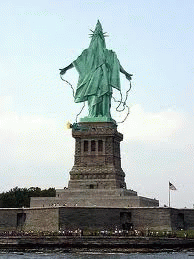To torture or not to torture, why is this question being asked in America? The answer you will receive is different depending on who you speak to.
Proponents of torture, such as Harvard law Professor Alan Dershowitz, argued in the immediate aftermath of 9/11 that there is a need in "exceptional circumstances" to resort to "legal torture."
Citing the ticking bomb scenario, Dershowitz argues that a "torture warrant" can be issued by a judge after being presented with "compelling evidence" that a suspect holds vital information that, if not disclosed to policing agencies on time, could lead to catastrophic consequences.
Pro-torture arguments, made by Dershowitz and others since 9/11, shaped the thinking of many US administration officials for years, and may be for decades, to come. The infamous Torture Memos that were prepared for former US President George Bush by John Yoo, then Deputy Assistant Attorney General, didn't exist in a vacuum; they were simply the end result of a few years of misleading, and often poisoned, intellectual and academic debate on the subject.
Torture proponents believe that unless intelligence agencies are granted extended powers, they will not be able to fight terrorism effectively. "Enhanced interrogation techniques" -- marketing name for torture -- like waterboarding and sleep deprivation became must-have tools in the arsenal of intelligence agents.
Fantasized utility of torture
Hollywood recently endorsed this notion by producing films that glorify the use of torture. For instance, Zero Dark Thirty, a recently released movie, focuses on the fantasized utility of torture; in this case, on information derived by torturing Ammar, a terrorism detainee. This intelligence, we are told, eventually led to the capture of Osama bin Laden.
If it were not for the fact that properly obtained intelligence led to the discovery of the precise location of the al-Qaeda leader, torture proponents would have scored a point. Time and again, those advocating the use of torture in the legal, academic, government and entertainment industries go to great lengths to convince us that torture works and ends up saving lives (as if we have already forgotten that the invasion of Iraq was mainly based on false intelligence that was derived through torture).
What Zero Dark Thirty obviously omitted to show is that the CIA agent Maya, the central character in the film, was the same agent who was behind misidentifying El-Masri as a terror suspect.
Those who don't know about the El-Masri case, he's a Lebanese-German Muslim who was kidnapped by the CIA in Macedonia. With the covert assistance of Macedonian authorities, he was held in incommunicado and harshly interrogated for over three weeks. He was then flown to Afghanistan where he was repeatedly tortured for five months.
When the CIA realized he was the wrong person, the agency dumped him back on a desolate street in Albania.
He has since been fighting legal and public relations battles with the US government. Recently, the European Court of Human Rights ruled in his favor, corroborating every single detail of his abduction and torture.
His legal fight in the US came to an end in 2007 after the Supreme Court refused to hear his case (after the US government had successfully argued in lower courts to dismiss his lawsuit based on national security grounds).
Opponents of torture have vigorously been embracing the notion that torture produces false intelligence. This implicitly leaves the door open for the possibility of endorsing torture if it were proven to produce sound intelligence.
I believe the whole debate with respect to whether torture produces "bad" or "good" information, or whether it is practised on "good guys" or "bad guys," leads us to a dangerous cliff.
(Note: You can view every article as one long page if you sign up as an Advocate Member, or higher).





